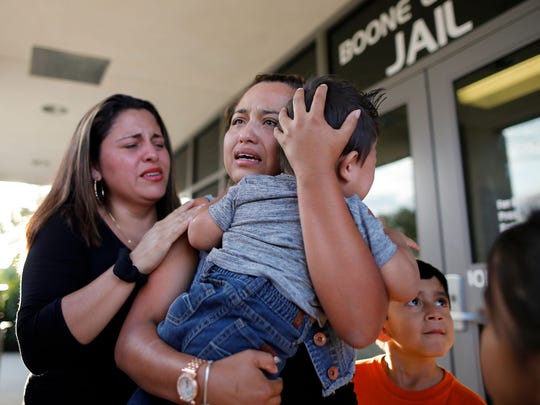Jewish Community Relations Council (JCRC)

[Enquirer] Opinion: Immigration Crisis a Local Issue, Too
To break through the politicized and polarized discussion on immigration, this September, the Jewish Council for Public Affairs (JCPA) led a 23-person delegation on a fact-finding trip to the Arizona-Mexico border to examine the human impact of U.S. policies and witness conditions facing migrants and asylum seekers firsthand.
The aim was for participants to better understand the situation at the border in order to more effectively advocate for sound immigration policies. Representing our Cincinnati Jewish Community Relations Council on the trip was Julie Leftwich, an international human rights advocate and executive director of the Immigrant and Refugee Law Center. She shares her experience, why the current immigration crisis is a local issue, and how she is leading a city-wide effort to help local immigrant and refugee families in an opinion piece for the Cincinnati Enquirer.
The article can be found online here. It is reprinted below. –Jackie
I’ll never forget the little girl, Veronica, who could have been my own. The curly hair, the big brown eyes, the happy smile sparkling at us despite the horror she was living. Her family had recently fled Venezuela due to extortion by the national police forces.
Despite the fact that her family, and many others like them, have the right under both international human rights law and U.S. law to seek asylum no matter where and no matter how they enter the country, they were being made to wait in Mexico, where migrants are subject to kidnapping, violence and extortion by the drug cartels that control the region.
I met this sweet family at a migrant shelter in Nogales, Mexico, during a recent intensive three-day fact-finding mission to the Arizona-Mexico border as a Cincinnati delegate with the Jewish Council for Public Affairs, in my capacity as executive director of the Immigrant and Refugee Law Center (IRLC) and member of the immigration committee of the Jewish Community Relations Council (JCRC).
Is there a crisis at the border? Yes. But the current disaster is much more complicated than the result of just one policy. It’s an accumulation of decades of failed policies exacerbated by the current hostile environment. And one thing is clear – it is human beings who are paying the price.
This is not about politics. This is about people. Children like Veronica. And 700,000 Dreamers, who came to the U.S. as children, but whose futures are now uncertain.
Is there something you can do about it locally? Yes. You can support organizations like the Immigrant and Refugee Law Center, which provides free legal services to low-income immigrant and refugee families. A one-of-a-kind organization based in Community Learning Centers in Cincinnati Public Schools, we provide assistance to individuals and families who are eligible for humanitarian-based immigration remedies enshrined in U.S. law. Our clients include refugees, asylum seekers, unaccompanied minors, and survivors of local crimes; we help people navigate our incredibly complex legal system to do things the right way.
We are also currently working, at request of the City of Cincinnati, to develop a rapid response network to prepare and respond to increased detention and separation of families, to ensure that members of our community can navigate the legal system and to care for children and families caught up in this mess.
We could not do the work we do without our volunteers, donors and supporters. Because it’s not just a border issue; it’s a local issue.
The migrants I met at the border – and those we work with here in Cincinnati – are human beings searching for safety and better lives for themselves and their families. IRLC receives families on a weekly, and sometimes daily, basis, who have just arrived from the border seeking safety and stability in Cincinnati. With asylum and immigration policies becoming more and more restrictive every day, it is becoming increasingly difficult for us to help them exercise their legal right to seek asylum.
We also work with Dreamers, recipients of DACA (Deferred Action for Childhood Arrivals), which since 2012 has allowed almost 700,000 young adults without legal status but who have been in the United States since they were children to work and study without fear of deportation. As the Supreme Court decides whether the Trump administration can lawfully terminate this program, the lives of hundreds of thousands of young people who contribute greatly to our schools, businesses and communities hangs in the balance.
Veronica’s father had one request: that we help them survive. He explained they’re not coming by choice, but instead to escape an impossible life, to work, and above all, to save their children. Isn’t that all any of us really want?
The United States is a nation of immigrants. And while our stories may vary, the Jewish community knows what it means to flee for safety and in search of better lives, and we know what it means to be turned away. As a member of the Jewish community, I would likely not exist today if my grandparents and great grandparents had not come to this country seeking refuge. No matter where we come from, no matter what our religion, ethnicity or culture, we all want the brightest future for ourselves and for our children. We must remember our shared humanity and work together to care for those affected by this immigration crisis.
Thanks for caring about our community and what we do.
Stay connected: sign up for our newsletter here.

